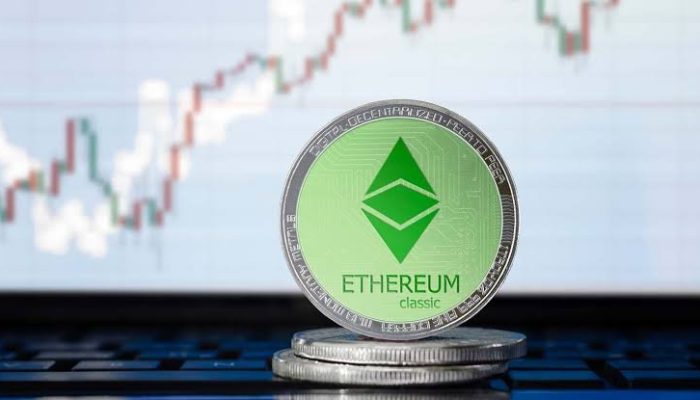The cryptocurrency space has reached a point where things got faster, safer, and cheaper than a few years ago. With the help of certain updates and new launches, each blockchain progresses and reaches new milestones, pushing its entire ecosystem further and challenging its projects to keep up with it. As the first network and cryptocurrency […]
The post What Is an Ordinals Wallet? The Top Ordinals Wallets for Storing Bitcoin appeared first on Coindoo.
The cryptocurrency space has reached a point where things got faster, safer, and cheaper than a few years ago. With the help of certain updates and new launches, each blockchain progresses and reaches new milestones, pushing its entire ecosystem further and challenging its projects to keep up with it.
As the first network and cryptocurrency ever developed, the Bitcoin blockchain is a key player in the industry. However, the technology behind it needed some improvements in order to maintain its place and popularity. Thus, Ordinals came to pave the way for new achievements in the Bitcoin ecosystem, and Ordinals wallets played a key role in the wide adoption of the new Ordinals concept.
-----Cryptonews AD----->>>Sign up for a Bybit account and claim exclusive rewards from the Bybit referral program! Plus, claim up to 6,045 USDT bonus at . https://www.bybit.com/invite?ref=PAR8BE
<<<-----Cryptonews AD-----
So, let’s talk about Ordinals and how they work, what Ordinals wallets are, and the best Ordinals wallets you can rely on.
What Is an Ordinals Wallet?
An Ordinals wallet is a Bitcoin wallet that supports the Ordinal protocol. It allows users to store, manage, view, send, and receive Ordinals inscriptions. A Bitcoin Ordinals wallet is often non-custodial, thus offering users control and ownership over their assets.
Ordinal wallets offer crypto enthusiasts the opportunity to connect to a Bitcoin Ordinal marketplace, choose the Ordinals they want to purchase or sell, and basically interact with this ecosystem seamlessly and securely store the Bitcoin assets they buy or receive.
What to Look for When Choosing an Ordinals Wallet?
Since the Ordinals protocol was launched, many Bitcoin wallets have been updated to support it, while some new ones have been released, especially for this new concept. Thus, at the moment, the Bitcoin network offers numerous options for those looking for an Ordinals wallet. However, there are some key features and benefits you should consider when choosing your go-to.
First, ensure the wallet you choose is user-friendly. This will improve your trading experience significantly. Regardless of your crypto knowledge and experience, a user-friendly interface will help you focus more on your digital asset management rather than how to find a certain feature in the dashboard.
Then, you should also look for a wallet that has robust security features. Security is vital, and a platform that puts it among its first priorities will surely offer you peace of mind. You can also look for a wallet that allows for biometric authentication or even opt for a hardware wallet.
Probably the most important feature you should look for is seamless integration with Ordinals marketplaces. If the wallet you choose does not provide this feature, and you want to trade Ordinals, what’s the point in choosing it?
About the Ordinals Protocol and Bitcoin Ordinals
Bitcoin ordinals can be considered similar to NFTs (Non-Fungible Tokens), as they are digital assets in the form of videos, images, audio files, and other such formats, only they are stored on the Bitcoin network. Bitcoin Ordinals were introduced in January 2023, after some previous attempts in 2014 and 2017.
The Ordinals protocol was developed in order to solve a pretty big issue of Bitcoin’s – the impossibility of minting NFTs on the network. In the Bitcoin ecosystem, it used to be extremely hard to mint NFTs compared to other blockchains, such as Ethereum, as Bitcoin has limited smart contract functionality and is affected by the lack of a token standard specially developed for NFTs.
Another intriguing feature of the Ordinals protocol is the BRC-20 standard. BRC-20 tokens are fungible tokens (just like ERC-20 tokens) that can be transferred through the Ordinals protocol. However, the main difference between BRC-20 and ERC-20 or other similar token standards is that the former does not use smart contracts.
Instead, BRC-20 uses Ordinals inscriptions of JSON data to manipulate the tokens. So, if you inscribe ordinals, you get BRC-20 tokens.
How Do Bitcoin Ordinals Work?
Bitcoin Ordinals are a bit different from traditional NFTs, but some elements are similar. For instance, the main features of Bitcoin NFTs include:
- Inscription – The metadata added onto Bitcoin satoshis;
- Metadata – The NFT properties, such as its name, description, and the file itself;
- Satoshi – The smallest denomination of a bitcoin (1/1,000,000,000);
- Token ID – A unique identifier code;
- Witness – The transaction signatures.
Bitcoin Ordinals work based on the Ordinal theory, a concept developed by Casey Rodarmor. The Ordinal theory offers each satoshi an individual identity, allowing users to track or transfer it. These details make the satoshi unique, thus becoming non-fungible.
Let’s look at this process closer, right?
First, we have a satoshi. The Ordinals protocol assigns it a sequential number. So, that satoshi becomes sat 49574957410487. Keep in mind that all satoshis are numbered in the order they are mined. So this satoshi is the 49574957410487th satoshi ever mined.
After receiving its number, the satoshi can be inscribed with data (all sorts of files) through a Bitcoin transaction. After the transaction is completed, it will be visible in a special wallet (Ordinals-supporting wallet).
The Need for Ordinals Wallets
So, since January 2023, we have been interacting with a new token standard on Bitcoin, as well as Bitcoin NFTs. Do Bitcoin wallets support them? I guess we all know the answer to this question.
Both Bitcoin users and wallets faced an issue once Ordinals started gaining popularity; considering the entirely new concept brought to the Bitcoin ecosystem, they were not developed to support the latest type of digital assets.
Thus, some decided to get through significant updates in order to support Ordinals, while other companies decided to build Ordinals wallets from scratch.
But what are some of the most trusted Ordinals wallets?
Top 5 Ordinals Wallets
1. Ordinals Wallet
Ordinals Wallet was launched on February 16, 2023, shortly after introducing Bitcoin Ordinals. It is one of the most trusted Ordinals wallet providers, having almost 500,000 wallets opened. Ordinals wallet is a non-custodial Bitcoin wallet, meaning that users are responsible for storing and managing their private keys as well as possible.
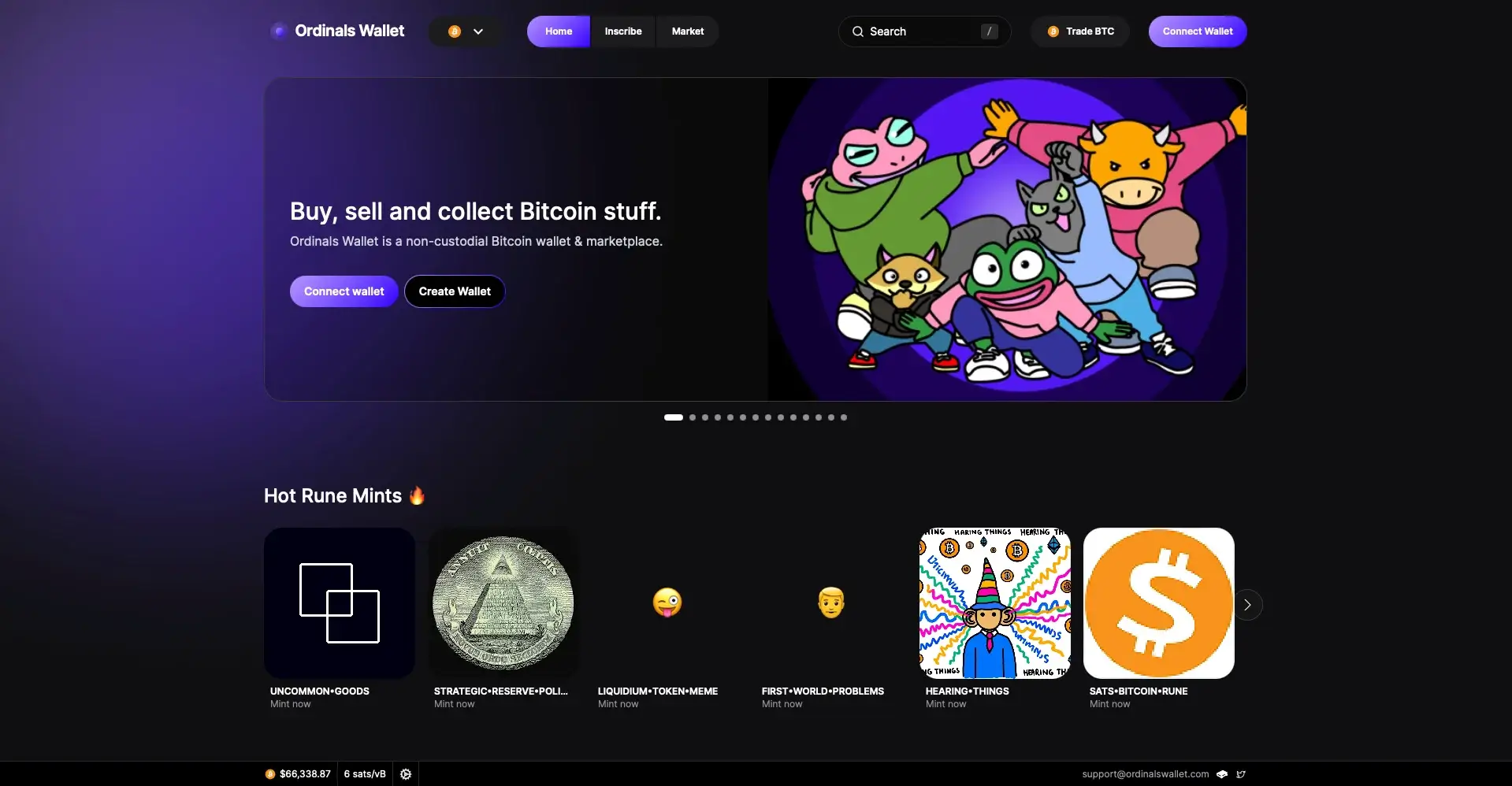
Ordinals Wallet’s built-in marketplace allows users to discover the Ordinals available and trade them as they like, gathering thousands of options available, with detailed statistics for each one.
Security is paramount for Ordinals Wallet. The wallet leverages encryption technology to secure private keys and transactions, thus ensuring that only users can access their funds.
Furthermore, Ordinals Wallet also benefits from the security provided by Bitcoin, the network on which it is built. This can lead to an extra layer of transparency and security, as well as the much-needed immutability.
2. Xverse Wallet
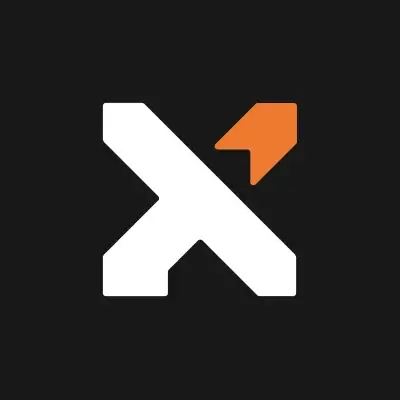
Xverse is a non-custodial wallet that allows users to connect with Bitcoin Ordinals marketplaces in a safe and transparent way. Xverse supports various Bitcoin-based assets, such as Ordinals, runes, rare sats, and others.
Xverse Bitcoin Ordinals Wallet also has built-in Ledger support, thus offering users the opportunity to leverage hardware wallets to store their assets.
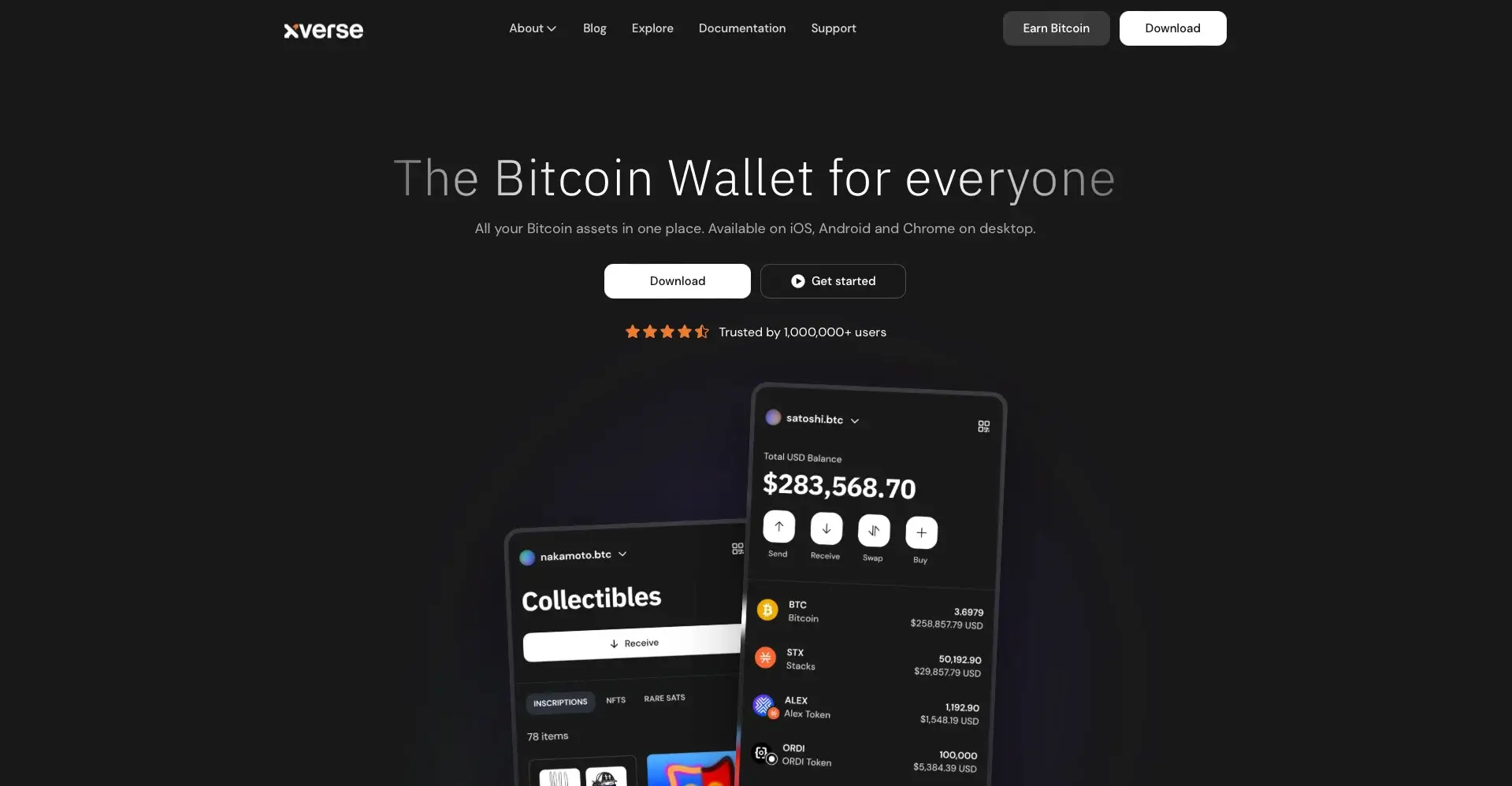
Xverse also focuses on security, providing advanced features that are available to all users. The wallet requires users to set up a strong password and keep their 12-word secret recovery phrase as safe as possible.
Besides, its mobile app, which is available on both iOS and Android devices, offers the option of setting up a 6-digit PIN, along with FaceID and/or TouchID.
3. Leather Wallet (formerly Hiro Wallet)

Leather Wallet (formerly known as Hiro Wallet) is a non-custodial wallet developed for Bitcoin and Bitcoin-based digital assets. It is one of the most popular such wallets, coming with significant benefits and valuable features available to worldwide users.
Leather offers a desktop app and a wallet extension, but according to the platform’s comparison, the latter is a better option as it offers more features. With the help of the desktop app, you can only send and receive STX tokens. However, through the wallet extension, you can also send and receive Ordinals, among many other options.
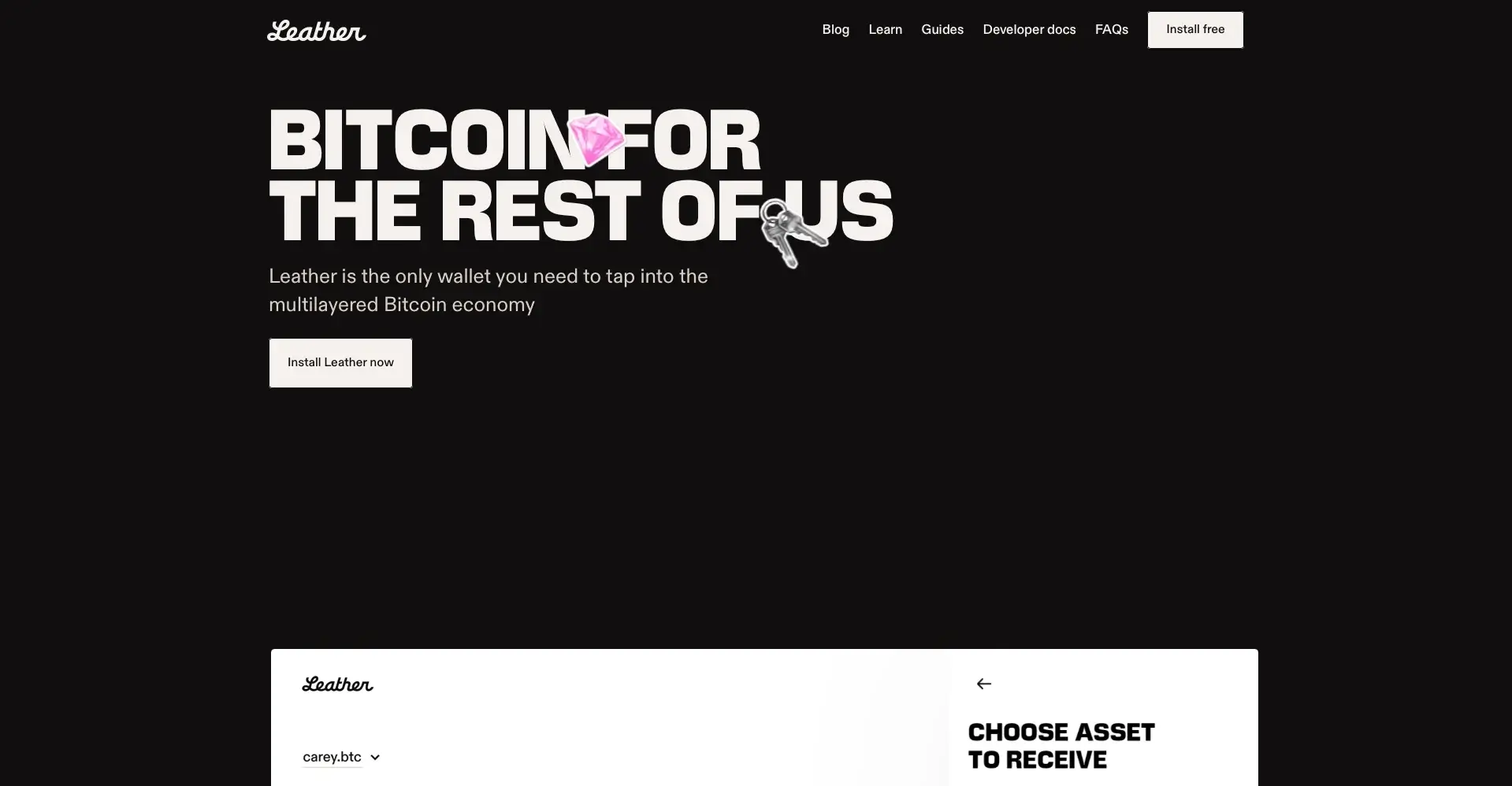
Leather Wallet constantly focuses on security, using multiple security layers to encrypt information. It also aims to protect users’ private keys as well as possible, so it has undergone an audit to find the features that need some improvements. Leather is also compatible with Ledger devices.
4. OKX Wallet
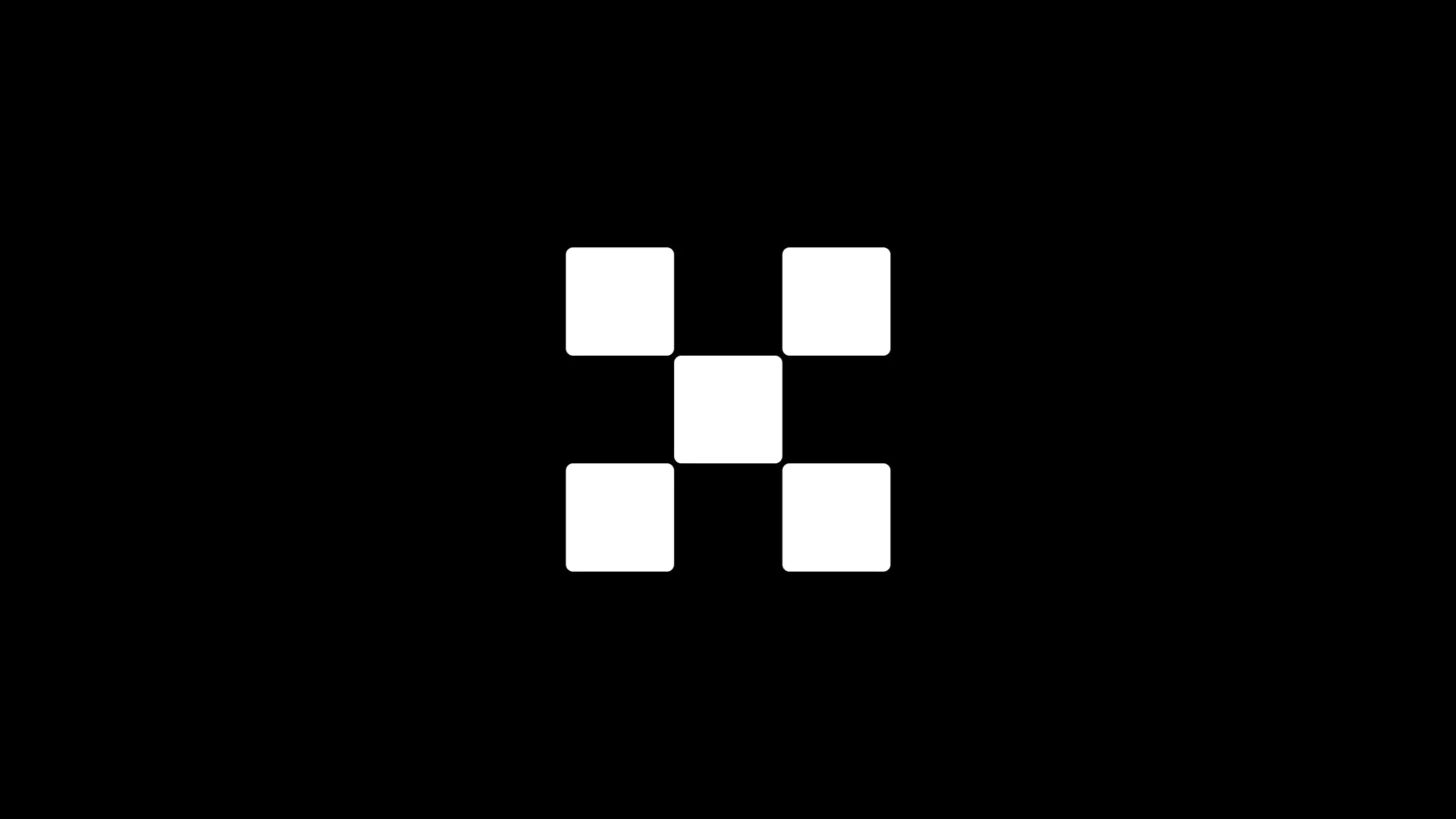
OKX is a prominent crypto exchange that also offers a Web3 wallet that is available as a desktop or mobile app. The desktop app is available on Windows and macOS, while the mobile one can be downloaded on Android and iOS devices.
The OKX wallet is non-custodial and fully decentralized, meaning that users have complete control over their private keys and assets and need to protect them as well as they can.
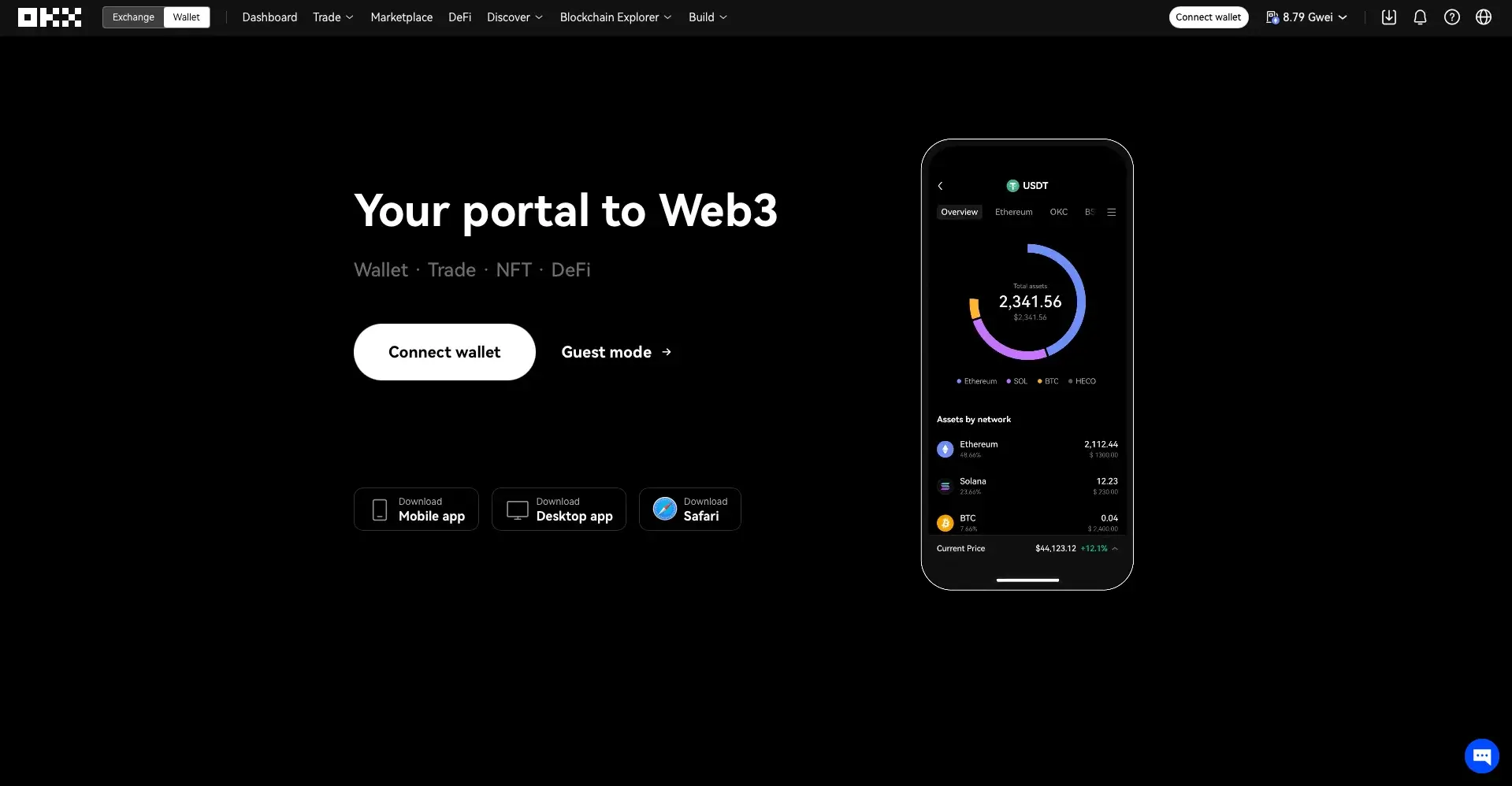
The OKX Web3 wallet connects to over 100 blockchain networks, thus allowing users to interact with thousands of dApps and DeFi platforms. It also supports Bitcoin and Ordinals, so it is a good option for those looking for an Ordinals wallet.
5. MetaMask Wallet
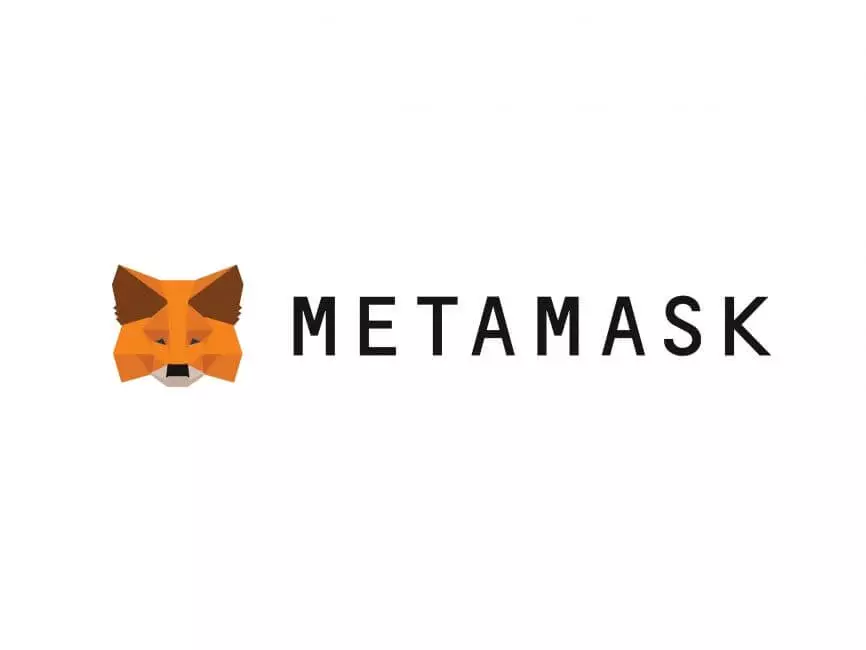
MetaMask is one of the most popular crypto wallets in the entire crypto market. It is renowned for its user-friendly interface and strong security measures. MetaMask is available as a browser extension on Chrome, Firefox, Brave, Edge, and Opera, and you can also download its app on iOS and Android devices.
The intriguing thing about MetaMask is that it is open-source software. This means that developers can test its security and look behind the platform, which increases transparency remarkably.
MetaMask is free to use, offering the same features to all its users. However, just as usual, transaction fees apply, depending on the blockchain you use and the network congestion.
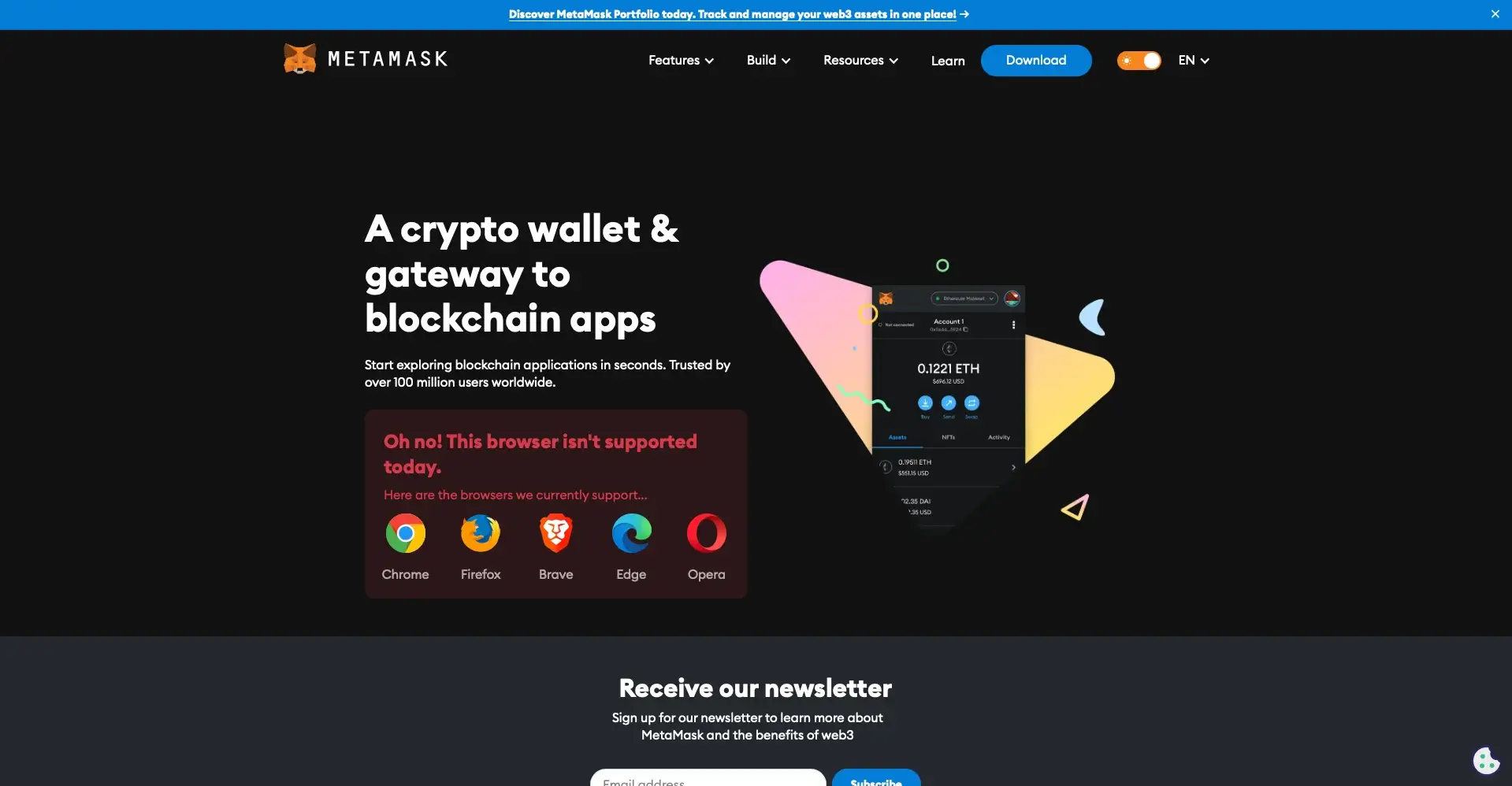
In what concerns security, it is essential to note that MetaMask is a self-custody wallet. Thus, it is extremely secure in case of a hack, but you also have to keep your password and recovery phrase as safe as possible.
Your account’s security can be based on the password you set up when signing up. The stronger the password, the safer you will be. MetaMask will require you to enter your password anytime you want to log into your wallet, whether you use the browser extension or the mobile app.
FAQ
Which wallet supports Ordinals?
There are numerous wallets that support Bitcoin Ordinals, most of them also being non-custodial, thus offering users full ownership over their private keys and funds. Some of the most popular Ordinals-supporting wallets include MetaMask, Ordinals Wallet, OKX, Xverse, and Leather.
Can MetaMask hold Ordinals?
Yes, MetaMask allows users to inscribe, store, and transfer Ordinals. All they have to do is install MetaMask, sign up (if you don’t have an account yet), generate your Ordinal address, and start sending, receiving, storing, and trading Ordinals directly on MetaMask.
Can you sell Ordinals?
Yes, you can purchase, sell, and trade Ordinals just like you would do with NFTs (Non-Fungible Tokens). All you have to do is go to a specialized marketplace, choose the Ordinals you want to buy or sell and complete the transaction.
Is Ordinals Wallet legit?
The Ordinals Wallet is one of the first Ordinals-supporting wallets developed, launched less than a month after Ordinals themselves were introduced in the crypto market. The wallet’s user-friendly interface and security measures make it an option worth considering when looking for an Ordinals wallet. It is also a non-custodial wallet, another advantage for crypto enthusiasts.
In Conclusion
Ordinals have changed Bitcoin’s journey entirely, offering the network numerous opportunities. Being a little similar to NFTs, Ordinals can take the form of an image, a video, an audio file, and much more.
Ordinals can be traded, bought, sold, sent, or received on specialized marketplaces, just like NFTs. They also need a place where they can be stored, and this is where Ordinals wallets come into play.
Ordinals wallets provide a safe way to store your Ordinals, usually being non-custodial. If you’re looking for an Ordinals wallet, keep in mind that you should look into its security features, choose an option that provides a user-friendly interface, and pay attention to the types of assets it supports.
The post What Is an Ordinals Wallet? The Top Ordinals Wallets for Storing Bitcoin appeared first on Coindoo.


